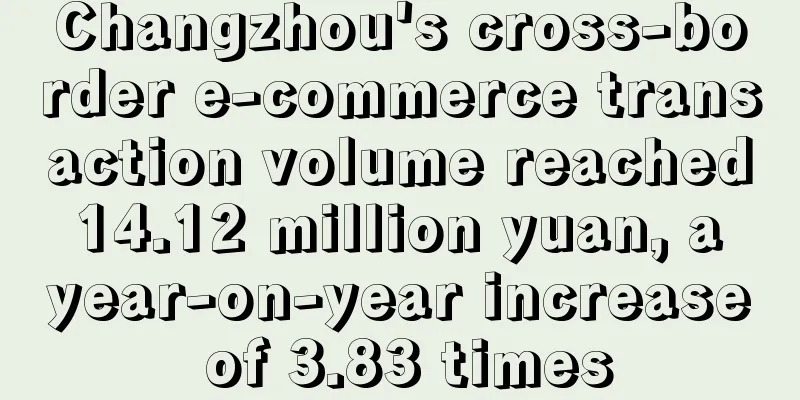According to data from the Municipal Bureau of Commerce, the city's cross-border online retail exports reached 820 million yuan in 2017, up 57.1% year-on-year, a significant increase over the previous year, ranking fifth in the province.
The growth rate of 57.1% can be described as explosive growth, and it is no exaggeration.
In the view of Chen Peigen, director of the E-commerce Department of the Municipal Bureau of Commerce, the rise of cross-border e-commerce coincides with the period of transformation and upgrading of foreign trade. It subverts the traditional industrial chain, penetrates both the supply and demand sides, and builds a new trust relationship between buyers and sellers. As a result, it quickly emerges as an emerging business model and becomes a timely rain for the transformation of Taizhou's foreign trade enterprises.
It is difficult to verify when cross-border e-commerce originated in Taizhou, but there is no doubt that Taizhou's cross-border e-commerce developed relatively late, and there is still a big gap compared with Hangzhou, Ningbo, Yiwu and other places.
It started late, but it has strong momentum. Looking back on the history of cross-border e-commerce in Taizhou, each milestone is still vivid in our minds.
In 2014, cross-border e-commerce started sporadically in Taizhou;
In 2015, Taizhou became one of the first pilot cities for the construction of provincial cross-border e-commerce parks, with transaction volume exceeding the 200 million US dollar mark for the first time;
In 2016, Tiantai was selected as one of the first batch of provincial industrial cluster cross-border e-commerce development pilot projects, and built special platforms such as "Alibaba Tiantai Automotive Supplies Industrial Belt" and "HC360 Tiantai Automotive Supplies Industrial Belt";
In 2017, the city’s first provincial-level cross-border e-commerce park was officially opened, with eight platforms and five supporting projects entering the park…
By the end of last year, Taizhou had 1,722 active online stores of various cross-border e-commerce (B2C export) such as AliExpress, Wish, eBay, and Amazon. In terms of B2B, there are currently 2,700 cross-border e-commerce suppliers in Taizhou cooperating with Alibaba International Station, and the growth rate of buyer credit guarantee data ranks second in the province.
Behind the surging spring tide is the reality of weak foreign trade in the past few years. To this end, Taizhou's foreign trade companies have found ways to transform themselves in various ways, allowing cross-border e-commerce to fill the gap and develop rapidly.
In turbulent times, opportunities often come to those who follow the trend.
From OEM to independent brand, and from 5% to 20% profit increase, this is the result of Taizhou's old photovoltaic company, Baoli New Energy, trying the waters of cross-border e-commerce. A few years ago, affected by the "two anti-one protection" policy of Europe and the United States, the photovoltaic industry fell into a cold winter. How to jump out of the deep pit is an urgent problem facing Cheng Baolit.
In mid-2015, the company decided to set up an e-commerce division. As a result, a team of only a few people started to generate revenue through cross-border e-commerce operations and by utilizing new foreign trade technologies and models. In just over a year, the amount of online credit insurance transactions on Alibaba exceeded 10 million.
They opened up new customer sources outside of traditional markets, gained market bargaining power, and saw profits increase significantly. At present, cross-border e-commerce sales account for 20% of Baoli’s total exports, and it ranks first in the global market share of the photovoltaic industry on Alibaba International Station.
The same situation also occurred in Zhejiang Zhengte Co., Ltd. As the leader of Linhai leisure products, Zhengte went online on the US e-commerce platform in 2014, breaking even that year and increasing its sales 13 times in the second year. Today, their own brand has become a well-known brand on Amazon in the United States and has ranked first among Amazon's recommended brands.
Like Baolit and Zhengte, more and more Taizhou companies are joining hands with cross-border e-commerce through "Internet + foreign trade", achieving overtaking and creating a new situation for foreign trade exports.
In addition, the government departments have spared no efforts to promote it, making cross-border e-commerce flourish in Taizhou. Our city is the first in the province to initiate the "east wind" policy to support the development of cross-border e-commerce, formulate relevant supporting regulations such as "Several Support Policies to Promote the Development of E-commerce" and "Several Opinions on the Development of Cross-border E-commerce", continuously release good news and create a good development atmosphere.
The strong manufacturing gene is Taizhou's most fundamental advantage in developing cross-border e-commerce.
Taizhou enterprises are mainly engaged in manufacturing, and the industrial clusters and block economic advantages such as Huangyan's plastic fast-moving consumer goods and Wenling's electromechanical water pumps are obvious. Nowadays, if you type "plastic" on AliExpress, more than half of the search results are from Taizhou.
"However, traditional companies focus more on production and less on sales. How can we improve the industrial chain and transform Taizhou into a strong city in foreign trade sales? This requires the help of cross-border e-commerce," said Wu Changyun, CEO of Taizhou Yundongli E-Commerce Co., Ltd.
Taizhou's well-developed private enterprises and strong manufacturing industry are inherent advantages that make cross-border e-commerce in Taizhou widely favored.

